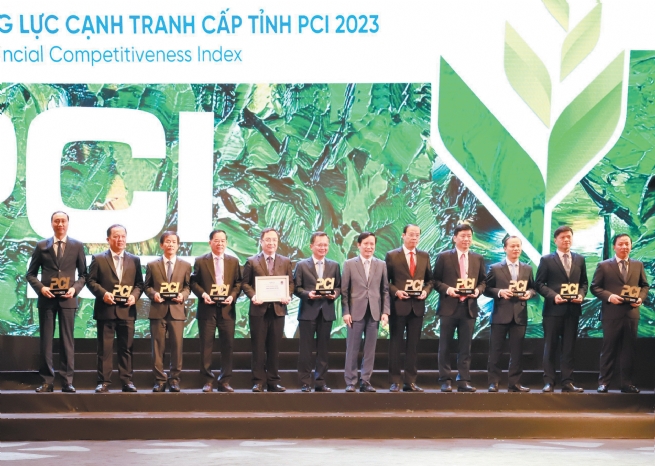2:47:03 PM | 5/28/2024
The 2023 Provincial Competitiveness Index (PCI) and Provincial Green Index (PGI) Report, published by the Vietnam Chamber of Commerce and Industry (VCCI) in collaboration with the United States Agency for International Development (USAID), highlighted the dynamic landscape for foreign direct investment (FDI) enterprises in Vietnam. The report recorded improvements in administrative procedures and a growing trend of FDI companies sourcing commodities and services from domestic vendors. However, the regulatory system still necessitates further refinement, particularly in simplifying tax-related administrative procedures.

VCCI President Pham Tan Cong presents the PCI trophies and certificates of recognition to the best performers in the 2023 PCI rankings
The report surveyed over 1,500 FDI firms operating in Vietnam, focusing on 25 provinces and cities with significant FDI presence. Utilizing a stratified random sampling methodology, similar to that used in global ease of doing business surveys, the respondents represented 54 countries and territories. The largest contingents were from South Korea (28.8%), Japan (23.0%) and China (10.4%).
Positive trends in Vietnam’s business environment for FDI firms
VCCI President Pham Tan Cong said that the PCI and PGI Report 2023 recorded positive movements in the Vietnamese business environment from the perspective of FDI firms. Despite the challenges posed by the COVID-19 pandemic, FDI firms are on a steady recovery path. In 2023, 59.9% of FDI firms in Vietnam recruited more workers, up from 55.8% in 2022, reflecting marked improvements in business performance. Profit-making FDI companies increased slightly to 46.5% in 2023, while loss-making firms declined to 42.3%. Despite these positive trends, optimism about business prospects has weakened, with only 26% of FDI firms expecting to expand production and business in the next two years, highlighting their caution amid an unpredictable global economy. Additionally, regulatory burdens on FDI firms have eased over time, with a declining number of companies encountering difficulties with administrative procedures. Specifically, only 16% and 8% of foreign-invested companies reported issues with tax and social insurance procedures, down from 27% and 15% in 2022, respectively.
The business structure of FDI enterprises has positively shifted to the technology and service-intensive industries of the knowledge economy. Many have used input goods and services supplied by domestic companies. FDI firms using domestic suppliers have gradually increased over time, notably from 63.3% in 2022 to 75% in 2023. This encouraging trend has partly come from the endeavor of local authorities to enable FDI firms to connect with domestic supporting industries. It is also an important indicator of domestic companies’ improved capabilities to integrate into global supply chains.
Insights from US, Japanese and Chinese investors
The 2023 PCI and PGI report provides an in-depth analysis of the business environment for FDI firms from three of Vietnam’s key partners: the United States, Japan and China. This year, Vietnam made significant strides in its relationships with these major partners. The elevation of the Vietnam-United States relationship to a “Comprehensive Strategic Partnership” has notably bolstered cooperation, particularly in high-tech sectors. Celebrating the 50th anniversary of diplomatic relations, Japan and Vietnam upgraded their ties to a “Comprehensive Strategic Partnership for peace and prosperity in Asia and the world”, emphasizing economic collaboration in advanced technology, green transformation and digitalization. Additionally, China's investment in Vietnam has surged in recent years due to supply chain diversification needs amid global trade tensions, with Vietnam and China also enhancing their comprehensive strategic partnership in 2023.
According to the report, US businesses predominantly operate in wholesale/retail, information and communications, and administrative support services. Nearly half of US investors are based in Ho Chi Minh City, focusing on industries that demand highly skilled and qualified workers. Chinese companies, making up 7.9% of respondents, typically have larger and more diverse workforces, with most employing over 200 people. These firms are spread across the country but are concentrated in northern localities with new industrial parks, benefiting from geographical proximity and competitive operating costs. Japanese firms are heavily involved in skill-intensive sectors such as administration, support services, and information and communications. They face significant challenges in recruiting technical (22%) and managerial (36%) personnel.
Each group of investors encounters distinct business challenges. US businesses frequently struggle with policies and regulations (22%) and administrative procedures (16%). Japanese companies face persistent issues with tax administrative procedures, with 72% experiencing difficulties in tax refunds - significantly higher than the 42% reported by firms from other countries. Tax settlement is also a major issue for 58% of Japanese respondents. Chinese companies report fewer problems with policies and regulations (9%) and administrative procedures (5%), but they face substantial challenges related to market fluctuations (38%) and customer acquisition (44%).
To seize opportunities from shifts in the global supply chain, according to the report, Vietnam needs to further improve policies and regulations and reform administrative procedures, especially those relating to tax, fire prevention, import-export and environment, while further facilitating connections between foreign investors with domestic partners and customers. Besides, developing and implementing more effective policies is necessary to enhance the quality of local human resources. In particular, it is necessary to pay attention to training workers with high technical and professional skills to gradually shift the domestic labor structure from reliance on competitively cheap labor advantages to a highly qualified workforce in an effort to attract high-quality foreign investment into Vietnam.
By Quynh Chi, Vietnam Business Forum